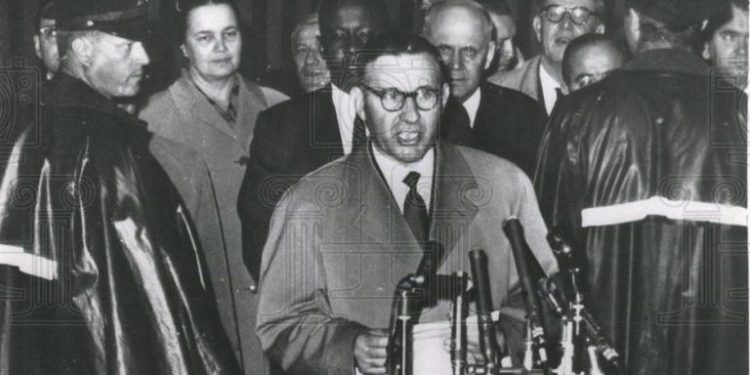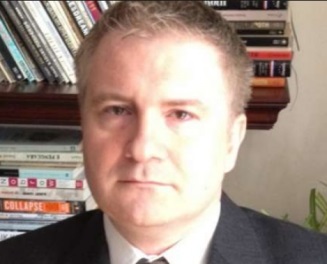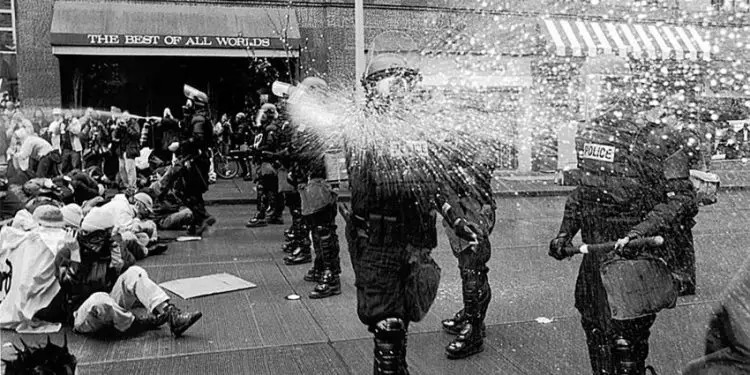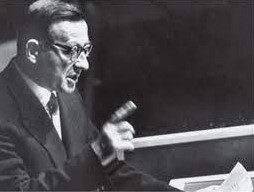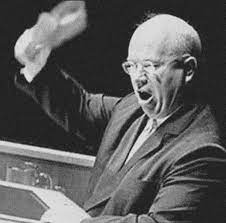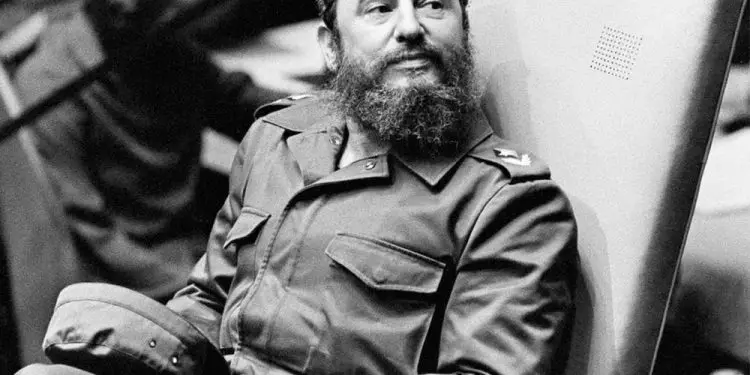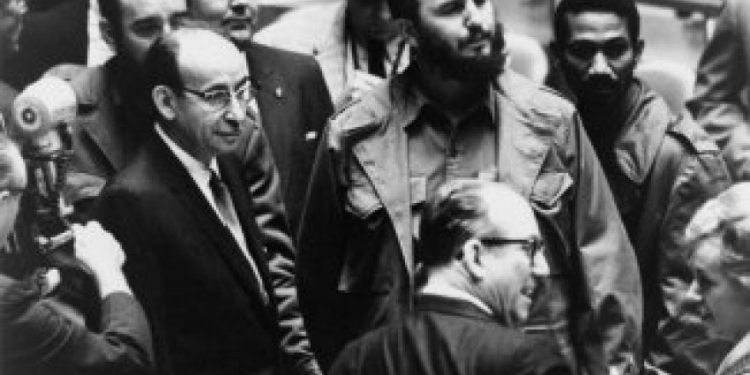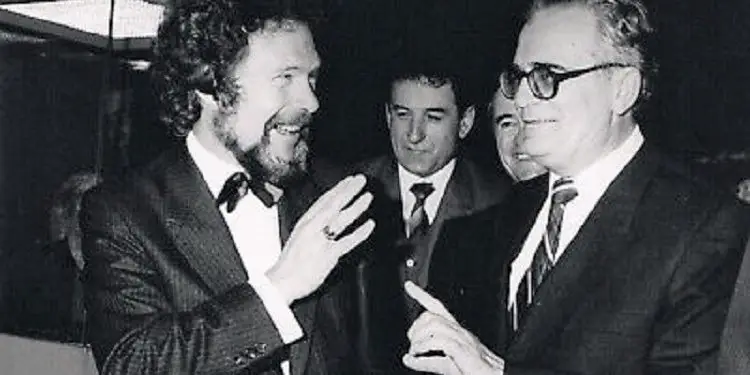By Ruben Avxhiu
-New York 1960, how Prime Minister Shehu was banned from leaving Manhattan-
Memorie.al / September of 1960 turned New York into a true capital of the world, as it happens now almost every year, in September, when the greatest leaders of the world come for the new session of the Assembly of General. Half a century ago, this had not yet become a tradition, and the landing of communist leaders, from Khrushchev, with his East Euro lackeys, to Fidel Castro, who had just taken power in Cuba, made an unusual impression. Among the communist leaders, there were also two problematic Balkans, Josip Broz Tito of Yugoslavia and Mehmet Shehu of Albania. Newspapers described New York those days as; “Rome of modern times”.
The arrival of the Africans
The communists never bothered to come to the ‘Glass Palace’ and they liked to mock the UN as a tool of the Americans. But that year, for the first time, 22 new African countries, which had gained independence from European colonialism in the last decade, would be presented at the General Assembly. 22 votes could overturn many situations in the UN and Khrushchev wanted to get this new group behind him as soon as possible. This was also the reason why President Eisenhower, although he was in the last weeks of his eight-year presidency, came from Washington to speak at the UN and to meet the representatives of the new countries.
The USA had strongly supported the liberation and independence of these countries, and enjoyed sympathy in Africa. On the other hand, even the communists with their early anti-imperialist and anti-colonialist slogans were strong competitors for political sympathy. The two wings of the Cold War would slowly shift the battle from Europe to Latin America, Africa, and especially to Asia.
Mehmet Shehu is banned from leaving Manhattan
In the US, there was concern that there might be an attack on communist leaders by dissidents living in the country or that pro-communist militants would be emboldened to riot or assassinate. Among the many communist leaders who landed in New York, only three had been notified by the US government that they were barred from leaving Manhattan Island. One of them was Mehmet Shehu, the Prime Minister of Albania. The decision was taken after harsh and offensive anti-American statements issued by the Albanian government in recent days. Albania at this time was getting ready to leave the Soviet Union and jump into the bosom of communist China, so indirect attacks against Moscow had begun.
One of the most favorite issues was the attitude towards the West. It was the time when Khrushchev had talked about coexistence and Enver Hoxha, following the example of China, was ringing the bells against the danger of American aggressors. Ironically, the “co-exists” Khrushchev, as well as the Hungarian leader, Janos Kadar, were banned from leaving Manhattan. In the weeks before the trip to New York, Khrushchev had resumed harsh anti-American propaganda to impress the Africans. The diplomatic circus had begun before he even left for the capital of the world.
Castro in Harlem
Fidel Castro, bearded, armed, cigar in mouth, loud, arrogant, surrounded by his revolutionary troops, and had just won power in Cuba. He had come to the USA to show America that it was coming to an end. At the “East Side Shelburne” hotel, where they were staying, they were bothered by the calls of the demonstrators against him. Some bodyguards came out with guns to scare the crowd, but the New York police forced them back inside. A little later, all the nerves, Castro and his spur, burst out of the door of the hotel. They left behind a room, turned into a garbage can, with food waste, reeking of cigars, empty bottles and damaged furniture. Castro was retaliating for the $10,000 the hotel had requested as a security deposit for room maintenance.
The famous Swedish diplomat, Dag Hammarskjold, who was Secretary General of the UN, whose name bears the square where Albanians have often gathered for demonstrations, in front of the UN, received him calmly in his office. American newspapers of the time wrote about the contrast of characters. Fidel, who was shouting in Spanish, and the calm Swede, who with his lip on the gas, almost amused by the scene, calmed him down and offered him and his spoor to eat on the terrace of the UN. Castro had cursed Manhattan as much as he could and threatened that; he would sleep in the UN garden or in Central Park, but not in the “capitalist hotels” of the city. Hammarskjold had a solution: a free room at the ‘Comodore’ hotel with the guarantee that he would not be disturbed by the demonstrations. But Castro had other plans.
While he was talking to the head of the UN, one of his men was in Harlem, renting an entire floor in the “Theresa” Hotel, as Castro said: “The Waldorf-Astoria of Harlem”. Although at this hotel he was asked for more than double what had been asked of him at Shelburne, he took it very willingly, for the money was merely an excuse for trouble to him. Having taken the properties from all the businessmen in Cuba, he now had as much money as he wanted. The reason why he went to Harlem was different. Now he wanted to take advantage of the poor position of blacks in the USA for his anti-American propaganda. A group of Puerto Ricans and Cubans who had gathered in front of the new hotel to cheer Castro were pushed away by the black people of Harlem, who didn’t care much about politics, but gathered to see the rare spectacle that was being offered.
Several squads of policemen were urgently dispatched to avoid clashes between the crowds. The other customers of the hotel began to complain and then leave an masse. Armed and uniformed Cubans commandeered the elevators and took control of the bathrooms. They spoke louder and showed no respect for others. In the first 24 hours, Castro and his staff spent double the price of the room, on other services: steaks, rum and cigars. The hotel employees, who brought food and drinks, complained that the Cubans were crooks and did not tip them (tip). “Daily News” wrote that Castro’s team had 85 people and that among the visitors of the night; there were many “blondes, brunettes and redheads”, which a detective had described as “prostitutes”.
A hotel worker revealed that Castro himself had a visitor from 2 to 3:30 in the morning: a tall blonde. “The worker did not know if they had discussed high topics of international politics”, the New York newspaper wrote ironically. “I’m among brothers here,” Castro told the media, speaking of Harlem’s blacks. “I feel like I’m in Cuba.” Among those who visited Castro, there was the Black Muslim leader, Malcolm X, the well-known poet of the young generation of that time, Allen Ginsburg, a professor of “Columbia University”, who was writing a book about the Cuban revolution, etc. Even Khrushchev himself, not at all jealous that someone else had become more of a diplomatic clown than he, paid him a visit in Harlem, in the crowded hotel lobby.
At one point, Khrushchev’s security chief, Colonel General Nikolai Zakharov, began pushing people left and right, but the police told him it was not his job to push the crowds. Zakharov punched back at them, but a tough American policeman grabbed him, lifted him into the air and didn’t let go until he was sure the officer had calmed down. After this incident, Khrushchev made an official protest against the American government and the City of New York. For American citizens, the New York policeman turned into a kind of hero. However, the “honeymoon” between Castro and Harlem was interrupted a few days later, after a tragic incident. Magdalena Urdaneta, a 9-year-old girl from Venezuela, had come to New York with her family.
She had done well in school and her parents had rewarded her by taking her with them on their visit to the US. They were having dinner in a restaurant, where 5-6 anti-Castro activists had also gathered. Someone had called Fidel’s men and they suddenly invaded the restaurant, surrounding the dissidents’ table. The quarrel degenerated into shooting and a bullet hit little Magdalena to death. The State Department accused “the aggressors of the Castro regime”. Fidel Castro personally expressed his regret for the killing of the little girl, but said that the bullet had come from his enemies, “from the Cuban criminals that America shelters”. Despite this clarification, the incident left a very bad taste and overshadowed Fidel’s circus in Harlem.
With shoes in hand in the Assembly
The circus of communist clowns continued in the General Assembly hall. Half a century ago, on October 12, 1960, Nikita Khrushchev, nervous, took off his shoe and slammed it furiously on the table, causing a kind of scandal that has gone down in history. Khrushchev, who used to boast about his peasant origins, was not known for sophisticated manners, but taking off his shoe did not leave a good taste. Since there is no photograph or video to prove the moment of removing the shoe, there have been doubts that it was not an invention of the media. Everything caught fire when the representative of the Philippines was speaking, who said that; The Soviet Union did well to demand a resolution for the colonized countries to become independent, but it would be even better if the resolution were extended to the countries of Eastern Europe, which were suffering under the practical occupation of the Soviet Union.
Khrushchev lit up and began to hit the table with his shoes, until he was given the floor, interrupting the Filipino’s speech. He doesn’t speak of the country, but went to the podium, arrogantly pushed the Filipino representative out of the country and asked the President of the Assembly, the Irishman Frederic Boland, to tell “the lackey of American imperialism to abide by the rules”. In fact, the President told the Filipino to avoid provocations in the room. However, as he continued to speak, Khrushchev kept hitting the table with his shoes. After a while, the speech was interrupted again, by a representative of Romania, who insulted the President of the Assembly himself. Boland, red in the face, hung up on the Romanian. Now all the communists in the hall had started shouting and making noise. Boland, fell the symbolic gavel, to ask for calm in the hall, until the gavel broke and he declared the session closed.
Khrushchev’s granddaughter, Nina L. Khrusheva, later said that; Khrushchev was wearing new shoes, which were tight and he had taken them off some time before the speech. His son, Sergei Khrushov, after he could not find any footage or photographs of that infamous session, wrote that; it was impossible for Khrushchev to have taken off his shoes, given how tight the space was and how fat he was. However, a former Soviet journalist wrote that a former UN employee once told him that Khrushchev’s shoe had come off his foot when he was walking towards his desk and she had taken it, wrapped in a paper napkin and given to him. He was too fat to wear it and had kept it on the table until he got to work.
Albania against the Soviet Union
Albania, until recently, was known as an obedient vassal of Moscow. Stalin’s intervention had saved Enver Hoxha from Tito, whose people in Belgrade, especially the Serbs, had begun to prefer the orthodox Koçi Xoxe more (or at least that’s how it seemed to Enver, who was paranoid by nature). Enver Hoxha enthusiastically joined Stalin’s initiative to exclude Yugoslavia from the socialist camp and turned from the loop to a personal enemy of Tito. However, it seemed crazy to Khrushchev that Stalin, “forgave” Yugoslavia to the West and in the framework of the rehabilitation of some of Stalin’s victims, tried to reconcile with Tito and instructed Enver to do the same. Belgrade was not against reconciliation, but Enver had to rehabilitate Koçi Xoxen, who had been executed as an enemy.
This alarmed Enver and his circle. They were afraid that in the end Tito, in cooperation with Khrushchev, would replace them with other communists at the head of the country. The next savior was China, with which the Soviet Union had entered into competition for the leadership of the socialist camp. China felt too big and strong to be a vassal of Moscow, while the Soviet Union had no intention of sharing the leadership of the camp with any other country. Mao Zedong, who was as crazy as Stalin, accused Khushov of revisionism and found only one supporter around the globe: Enver Hoxha. In return, China denounced the rapprochement of the Soviet Union with Yugoslavia. Although they were still trying to maintain the facade, between Moscow and Tirana, the big rift had started. In these conditions, comes the date of the General Assembly in New York. Meaningfully, all the communist leaders traveled together to New York, on the “Baltika” ferry. The representatives of Albania did not invite them or invited them, but they did not accept the invitation to travel together.
Why didn’t Enver Hoxha go to New York?
Enver Hoxha decided that Albania should be represented by Prime Minister Mehmet Shehu, his right wing, the fiercest and most anti-Yugoslav ally, but also the fiercest criminal who served the regime. Why didn’t Enveri himself participate in this world circus of diplomacy?! He probably did not guess how much of a stir this session of the UN General Assembly would make. Or perhaps, he was not yet ready to face Khrushchev (which he would do two months later in Moscow, at the meeting of 81 communist and socialist parties). Perhaps he was still studying the situation, to see to what point the rift would deepen. Or, or, maybe that extraordinary paranoia had started, which would make him never go out officially and publicly, outside the borders of the country, fearing that he would be killed. His trip to Moscow, in 1960, would be his last.
Against armaments in the Balkans
Mehmet Shehu traveled to New York, on the “Queen Elisabeth” ferry. By coincidence, this target included the Yugoslav leader, Josip Broz Tito. Mehmeti hated the Yugoslavs, because they had removed him from his post, describing him as “very extremist”. But later, after the suicide, when Enver declared him a “polyagent”, he used this random trip on a ferry with Tito as a fact to show that Mehmet was an agent of the Yugoslavs. Mehmet Shehu actually committed many crimes and had dubious connections in all directions, but he was not so stupid as not to understand that the Yugoslavs had him on their black list and if they were to return, they would to take his life. In New York, Khrushchev, who already knew Albania’s “treason”, ignored the Shehu’s presence and, in his eyes, embraced Tito with all his love. But even Mehmeti would take revenge quickly, but in an indirect way. Khrushchev was determined to impress Africans and independent observers with his initiative for a Balkans free of nuclear weapons.
The aim was to force the Americans to remove their nuclear missiles from Turkey, from where they could easily hit any Soviet city. With this, he killed “two birds with one stone”. He also made the Americans remove their bases from Turkey, and took the submarines from the hands of the Albanians, which he had given them for the Pashaliman base, because they were crossing over to the side of China. Moscow had nothing to lose, because after the break with the Albanians, it would close that base anyway. However, the Albanians did not like the dictates of Moscow, and they did not intend to release their submarines. At the meeting of the Political Committee of the General Assembly, Albania was represented by its Foreign Minister at that time, Behar Shtylla. He voted against the Soviet draft resolution, arguing that nuclear weapons should be eliminated worldwide. Banning them only from the Balkan region makes no sense. The Albanian vote made the Soviets even more nervous. While on other planets, the communists were on a front. Especially on the issue of peacekeepers in the Congo.
The Secretary General of the UN was attacked with criticism for his report. Criticism came from two ambassadors to the UN, Russia’s Zorin and Albania’s Reiz Malile. In his speech held at the General Assembly, Mehmet Shehu attacked American imperialism and demanded the membership of China, whose place Taiwan had occupied for more than ten years. The USA and many countries of the world did not recognize the communist government of China and treated as a representative of China, the government of Chiang Kai-shek, which held the island of Taiwan, while the “Red Revolution” had won on the mainland of Mao Zedong. This was the beginning of a long war of Albania for China in the UN, a war which ended with victory in 1971, when China and the USA merged with each other the country lost its membership in the UN. The Albanian position at the UN was also the penultimate stage of the clash with the Soviets. At that time, Khrushchev continued to have a hope that Albania would be convinced to leave China and remain in the Soviet fold.
Anti-communists, but above all patriots
The arrival of the prime minister of the Albanian communist state in New York gave the opportunity to many political immigrants from Albania to publicly protest before the UN, against the dictatorial regime of Enver Hoxha. A number of Albanians had gathered on September 20, 1960, to protest against communism in the square in front of the UN building. They issued appeals against Mehmet Shehu and against the Albanian government. A much larger group was protesting not far from them. They were Greeks who were looking for “Vorio-Epirin” and had also come out to protest against Mehmet Shehu. It didn’t take long and the anti-communist Albanians left their protest and attacked the Greeks, cursing them and telling them that they were the ones who had taken the Albanian lands and not the other way around.
After that, fists broke out, blow with umbrellas and placards. A bloodied Albanian in that demonstration was captured by the well-known magazine “Life” and accompanies this article. A large squadron of policemen, many of whom with rubber batons, on top of high horses, could hardly separate the Albanians from the Greeks. Many of the demonstrators had torn clothes and signs of violence on their faces. This was an interesting example, to prove how the national question remained more important for Albanians, than the ideological one. The Greeks had told the newspaper “The New York Times” that those who had attacked were a small group of 20 “Albanian communists”.
The day of September 20, was a day of beatings in the streets of New York. Anti-Soviet demonstrators, mostly Hungarian and Ukrainian immigrants, protested in front of the Russian consulate and were dispersed two or three times, with clashes by the police. An attempt to burn a Soviet flag was also thwarted by the New York police. In the evening, an Albanian named Gjok Dragusha, 29 years old, was arrested (according to “The New York Times”) during a demonstration near Fidel Castro’s hotel in Harlem. To a policeman’s order to leave, he and an American, Bennie Bryant, had responded by hitting him with umbrellas. The police had handcuffed both of them.
EPILOGUE
Just a few weeks after the tense diplomatic events at the UN, in the US presidential election, Democrat John F. Kennedy won against staunch anti-Communist Richard Nixon. This victory was hailed as a great occasion for world peace. In fact, very soon the situation would be darkened with the crisis of Berlin and that of the missiles in Cuba. Kennedy would quickly learn that with the Soviets, gentleness did not work, while Khrushchev would learn that Kennedy’s youth and gentleness did not mean that he was not ready to meet violence with violence. But in that feverish autumn of 1960, these things were not yet known. However, the diplomatic circus had given a clear sign that the reports in the UN from here on would start to change drastically, so much so that almost half a century later, it is the Americans who complain the most about this organization, while Moscow and Beijing are firmly behind it. Memorie.al




